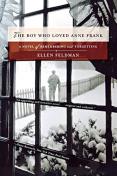BKMT READING GUIDES
The Boy Who Loved Anne Frank: A Novel
by Ellen Feldman
Paperback : 288 pages
2 clubs reading this now
0 members have read this book
On February 16, 1944, Anne Frank recorded in her diary that Peter, whom she at first disliked but eventually came to love, had confided in her that if he got out alive, he would reinvent ...
Introduction
"An appealing and inventive novel…original and cathartic."—Dana Kennedy, New York Times
On February 16, 1944, Anne Frank recorded in her diary that Peter, whom she at first disliked but eventually came to love, had confided in her that if he got out alive, he would reinvent himself entirely. This is the story of what might have happened if the boy in hiding survived to become a man.
Peter arrives in America, the land of self-creation; he flourishes in business, marries, and raises a family. He thrives in the present, plans for the future, and has no past. But when The Diary of a Young Girl is published to worldwide acclaim and gives rise to bitter infighting, he realizes the cost of forgetting.
Based on extensive research of Peter van Pels and the strange and disturbing life Anne Frank's diary took on after her death, this is a novel about the memory of death, the death of memory, and the inescapability of the past. Reading group guide included.
Discussion Questions
Discussion questions from the publisher's reading guide:Discussion Questions
1) The day Peter landed in America, he made a momentous choice. Discuss its practical and emotional repercussions for him and its moral implications, if any, for all of us.
2) Madeline and her sister Susannah react in diametrically opposed ways to Peter. What does their respective behavior say about who they are as individuals and what they want? Which scenes made their views clear to you?
3) When Susannah refuses to marry Peter, he compares her reasoning to the Nazi racial laws. Is his analogy valid?
4) Determined to erase his past, Peter gets as far as the plastic surgeon's office. What makes him change his mind about having his concentration camp number removed?
5) Toward the end of the book, Peter speaks of his sister-in-law Susannah's "vicarious wearing of the yellow star." What does he mean by this, and do you think it is a justifiable charge?
6) Peter's epiphany comes not from the scenes of misery that the diary reawakens, but from the memory of a time before his family went into hiding. What is the significance of this memory for Peter, and for all of us?
7) When the widow of the dentist hiding with the Franks wrote to complain of the portrayal of her husband in the play, the playwrights answered that if they had not depicted him as they had, the play would have closed on opening night and millions would never have learned of Anne and her suffering. Assuming that the playwrights were right and a more faithful rendering of the diary would not have found an audience, do you think that bringing Anne's story to millions justifies the sacrifice of the memory of two innocent men?
8) The worldwide success of Anne's diary and the play and movie made from it have been phenomenal. Some ascribe this to the fact that the diary is not about the horrors going on outside the secret annex but the coming of age of a young girl within it. Do you agree with this? Can you find other explanations of why Anne's diary became a classic while other journals of the period, many by young people, garnered little attention?
9) The most frequently quoted line from Anne's diary is "I still believe, in spite of everything, that people are good at heart." But she also wrote, "There's a destructive urge in people, the urge to rage, murder, and kill." The second line is rarely quoted. In the light of the different fates of these two statements, discuss one scholar's comment that if Anne Frank returned today, she would be appalled at the misuse to which her diary has been put.
10) When Peter asks the man in the synagogue, who says he is not a believer, why he comes to prayers every morning, the man answers, "Someone got to come." What does he mean by the statement?
11) The actress Gusti Huber continued to make movies under the Third Reich until the end of the war. Do you think she should have been permitted to play Mrs. Frank in the play and movie?
12) Peter is a man tortured by the death of memory and the memory of death. Do you see his life, despite all its outward success and inward anguish, as a triumph or failure of the human spirit?
Book Club Recommendations
Recommended to book clubs by 0 of 0 members.
Book Club HQ to over 90,000+ book clubs and ready to welcome yours.
Get free weekly updates on top club picks, book giveaways, author events and more








